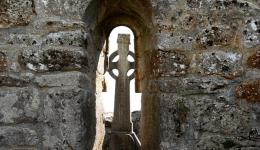Category:
Jesus is the Messiah and He is Lord.
There were Jewish and there were Gentile implications to be concluded. When Saul (who would become St. Paul) was confronted with this reality, there were many, many aspects of truth for Israel that had come to fulness and that would be further carried forward within the plans of God for this world and for all creation.
Throughout the history of the Church, we can see and describe the various ways in which Christians wrestled with the reality of God comes to earth in Jesus, and with the resulting implications for their day, context and times.
It's difficult to discern what it is that God wants us to be doing in our day, in the light of the fact that Jesus is Messiah and Jesus is Lord. We can describe how the early church lived this out, for example in the inspired accounts within the Scripture itself, and for instance in the Book of Acts. We know some of how the early Church Fathers sought to work out the implications in their day, often against the powers and authorities of their times. We can follow various threads - in the development of the Western Church, the Church in Africa and the Church in the East. We can see how Luther, Calvin and the other Reformers wrestled with the implications, asking questions and answering them as best they could, God helping them and given their measure of biblical insight and understanding about the Person and Work of the Lord Jesus, the Messiah. We see how during periods, say, of 'great awakenings' as in the UK and America under the influence of such leaders as Whitefield and Wesley, the revival and expanse of the Church, as followers of Jesus, well, followed.
The difficulty if not the danger in ascertaining the implications of the Lordship of Christ, and the fact that He is Israel's Messiah, lies in asking the questions of another time and fleshing out answers as for our times but which are not correct nor helpful. They answer questions rightly asked in and for other times, and we may agree (or not) that the living-out implications of such biblical perspetive in those times was right. But may we also say that such questions and answers are not necessarily normative for all times, let alone for the specific times, contexts and situations in which we live. Jesus is Messiah but what does that mean for today? Jesus is Lord; what now it's implications and applications for our lives and faithful ministries?
The questions and answers asked and answered may indeed be right (to a point and/or to a pointed situation), perhaps in essence continuing the needed strands of faith and faithfulness for our times, but perhaps not giving the nuance and specificity or totally different window of approach and application that is needed. We must return time and again to the essence of the Scriptures and of the Gospel, praying and listening to the Spirit, yes in seeking to learn learning how that's been worked in previous times and other contexts in history, and perhaps even contemporaneously with us albeit in other parts of the world, but even more so seeking to find the fresh truth based on eternal verities of the Word that God would yet reveal to and through us, that written Word and that Word Who became flesh and dwelt among us for a season, and who continues to indwell and lead His Church by His Spirit.
Giving medieval answers framed by medieval questions will not guide the Church clearly or nearly enough, as it should be guided in the 21st Century by Jesus Himself, Who remains Lord and and Saviour, the Messiah of Israel and the Christ of God and of the Gentiles.
What did St. Paul understand and have in mind, written by God's Spirit's guidance in the First Century, that remains true in all times and in all places? And what, if anything, changes or whose light and truth flashes forth with more clarity and impact, as it is fleshed out in the various times, cultures and contexts of history and particularly for us, of our day?








